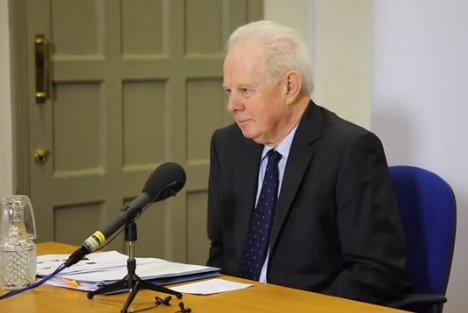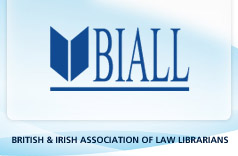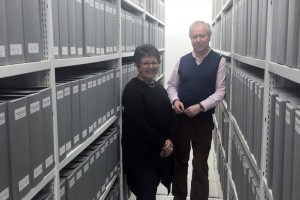Weekly Notes: legal news from ICLR – 20 November 2015
This week’s roundup of legal news and comment includes information technology in the courts, legal information in the library, a regulatory sandbox for financial product development, and a pair of litigious dogs being hounded out of court. Civil Litigation Back to the future that never was… will it be now? At his recent press conference on… Continue reading
This week’s roundup of legal news and comment includes information technology in the courts, legal information in the library, a regulatory sandbox for financial product development, and a pair of litigious dogs being hounded out of court.
Civil Litigation
Back to the future that never was… will it be now?

At his recent press conference on 17 November, the Lord Chief Justice, Lord Thomas of Cwmgiedd, when asked about the problem of access to justice, admitted
“we have an expensive process. Lord Woolf pioneered these great reforms and was promised, in 1999, IT.
It has never come…”
His complaint echoes the frustration expressed on many occasions by Sir Henry Brooke, a former Lord Justice of Appeal, who from 2001-4 was judge in charge of modernisation of the courts. In 2002 the government refused to back plans for modernisation of the civil and family courts because there was “no new money available from the Treasury” (which at the time was happy to fling sackloads of cash at schools and hospitals). It was an extremely short-sighted decision, based on the flawed notion of “full costs recovery” (ie that the legal system should pay for itself), as Sir Henry explained in a recent interview with Catherine Baksi (Legal Hackette’s Brief )
‘We had got plans afoot to put into action what they are talking about doing now, 13 years later. A huge amount of damage has been done because of that decision. It was absolutely devastating.’
No one who has seen the courts struggle with technology in recent years, who has witnessed the antique ways in which cases are still filed and documents served, or who has struggled to get a wifi signal in a court building so they can use legal materials which are only conveniently available online, can possibly dissent from that sense of frustration, which Lord Thomas must feel as much as Sir Henry Brooke.
So will Lord Thomas get the funds needed for the modernisation reforms this time round? It seems possible but by no means certain. Some progress has undoubtedly been made. The Technology and Construction Court, which hears document-heavy building disputes in the Rolls Building in Fetter Lane, conducted a pilot scheme over the summer to try e-filing of claims. Now the pilot scheme is to be rolled out, so to speak, to all the other jurisdictions in the Rolls Building, including the Commercial Court, the Chancery Division, the Admiralty Court, the Bankruptcy and Companies Courts, and the Mercantile Court.
For more details: CE File
Practice Direction 510 – The Electronic Working Pilot Scheme
There are plans afoot for an Online Court. Lord Thomas believes “we can use modern technology to take justice back to basics”. It may mean fewer court buildings but more offices for judges, who can use them to hold hearings online.
“If a lawyer can stay in his office and be connected to the court, it saves money to the lawyer and hence he can increase his income but the result to the courts will remain the same. So we are hopeful we can make a big change there.”
Presumably, lower overheads for lawyers, fewer travelling expenses and the like, will enable them to charge lower fees and widen access to justice for those without money to pay through the nose for it.
Meanwhile, the prospect of Online Courts and how the distribution of business of litigation is going to be allocated between them and the Courty Court and the High Court is one of the major themes in the current Civil Courts Structure Review, being conducted by Lord Justice Briggs, with a view to his delivering an initial report by the end of 2015.
Other topics for review include the use of Delegated Judicial Officers (DJOs) to carry out low level routine judicial tasks; and how to reduce the backlog of cases awaiting attention in the Court of Appeal, for example by allocating appeals from lower first instance courts to the High Court. Looking at the Briggs Review in the round, it looks as though it could result in a major shakeup of the current jurisdictional distribution of the courts, and comparisons with the Judicature Acts of the 1870s may not be out of place. (Hold onto your wigs, everyone, assuming they’re still being worn…)
For more details, see Civil Courts Structure Review, via the Chancery Bar Association.
Legal information
What do law librarians do?
Clare Brown Library and Information Manager at Collyer Bristow describes her work in a profile on the Career Development Group of the Library Association of Ireland (LAI).
“The core skills for legal information professionals are being able to help users find the right information, at the right time, presented in the right way, and for the right price.”
But “more specific to the legal information role has been a requirement to add value to raw information”. This includes filtering for “relevance, importance and currency”.
(In some ways this sounds a lot like what law reporters do.)
She says “The most rewarding part of my role has been the recognition of my writing skills by the firm”.
What should they call themselves?
The AALL or American Association of Law Libraries is discussing changing its name to ALI, or the Association for Legal Information. Apparently this is pronounced Ally (as in, the allies) rather than Ali, as in Ali Babar. You can follow heated discussions on Twitter using the hashtag #AALLorALI
According to their recent e-briefing,
The Board is convinced that a name change is a necessary and healthy conversation for all of us to have as we position our Association for the future. Ultimately, it is up to all of you to decide, as we plan to put this forward for a vote on January 12.
 Meanwhile BIALL, the British and Irish Association of Law Librarians, has voted to retain its name (despite the potentially bilous associations conjured up by the pronunciation of its acronym). However, the membership is now locked in a discussion over the design of its logo (depicted) which some feel is outdated both in terms of visual appearance and in its use of a physical book as a defining icon. So they have commissioned a selection of new designs for members to vote on. We can’t show them to you here, but members have been sent a link to the voting page.
Meanwhile BIALL, the British and Irish Association of Law Librarians, has voted to retain its name (despite the potentially bilous associations conjured up by the pronunciation of its acronym). However, the membership is now locked in a discussion over the design of its logo (depicted) which some feel is outdated both in terms of visual appearance and in its use of a physical book as a defining icon. So they have commissioned a selection of new designs for members to vote on. We can’t show them to you here, but members have been sent a link to the voting page.
The academic librarian
Finally, on this topic, his week Daniel Hoadley and Paul Magrath of ICLR visited that doyenne of law librarians, Ruth Bird at the Bodleian Law Library in Oxford. Ruth has been at Oxford since 2004; previously she worked at law firm Phillips Fox (now DLA Piper), the University of Melbourne, and before that in law firm, Arthur Robinson & Hedderwicks, (now Allens Linklaters). However, she began her career as a secondary school teacher and teaching still forms a large part of how she views the role of an academic law librarian. She says the best time to teach a student how to find legal materials often is not when they’ve just arrived and don’t know what they need, but when they come to you later because they really need to find particular materials for an assignment.
Ruth is also an Honorary Bencher at Middle Temple, and believes they have better managed the reallocation of library space to permit expansion of the Inn’s other activities than Inner Temple seem to be at risk of doing with the alarmingly radical Option 2 proposal (see Weekly Notes – 13 November)
 We spent a constructive day discussing the English Reports, the globalisation of the common law, the importance of retaining hard copy legal materials and the woefully shortsighted decision of Parliament, or some bean-counting little committee thereof, to stop recording new statutes of the realm on vellum.
We spent a constructive day discussing the English Reports, the globalisation of the common law, the importance of retaining hard copy legal materials and the woefully shortsighted decision of Parliament, or some bean-counting little committee thereof, to stop recording new statutes of the realm on vellum.

Having taken us on a tour of her library, Ruth took us on a delightful tour of old Oxford, and showed us some of the famous and picturesque colleges, churches, and libraries, all honey-stoned in the chill autumn sunshine.
Financial Services
FCA launches innovation sandbox
Toddlers with bucket and spade can keep out. This “sandbox” is a forgiving environment in which developers of new financial services can “disrupt” existing praxis and experiment with new ideas without fear of regulatory inhibition – subject of course to consumer safeguards. According to Pinsent Masons’ Out-Law newsletter:
The scheme will expand the scope of the FCA’s existing Project Innovate through which the FCA runs an Innovation Hub to help companies looking to use technology to disrupt the UK’s financial services sector address regulatory compliance issues.
Benefits of the sandbox initiative could include reducing the time and cost companies spend in bringing ideas to market, helping those businesses to gain greater access to finance and providing for greater choice of products for consumers in the market, the FCA said.
“We believe that it is feasible for the FCA to reduce some of the existing regulatory barriers to firms that are testing new ideas, while also maintaining suitable safeguards,” the FCA said (26-page / 462KB PDF) in a document outlining its latest proposals.
Dates and Deadlines
Politeia’s new series Changing Course for British Democracy
opens on 24 November with a debate on the topic: Parliament and Government – An Imbalance of Power?
Debating the issues will be:
- Graham Brady MP, Chairman, 1922 Committee;
- Simon Heffer, Columnist, The Sunday Telegraph;
- Rt Hon Gisela Stuart MP, Intelligence and Security C’ttee;
- Lord McFall, House of Lords (Treasury Select C’ttee 2001-10)
Tuesday 24th November, between 7.30 and 8.30 p.m, at the Army and Navy Club, 36-39 Pall Mall, SW1Y 5JN
To attend, email secretary2@politeia.co.uk
The Ninth Annual Hart Judicial Review Conference,
A one day conference chaired by Michael Beloff QC, with appearances by Adam Wagner, Richard Gordon QC and and interview by Clive Coleman of Sir Ross Cranston, among others.
Friday, 11th Dec 2015, The Cavendish Conference Centre
22 Duchess Mews, London, W1G 9DT
Details: Hart Publishing.
Law (and injustice) from around the world
Australia
Asylum seeker policies criticised
Australia’s asylum seeker policies have been heavily criticised at a session of the UN’s leading human rights body in Geneva, according to ABC news. This is the second time Australia has faced a periodic review by the Human Rights Council, which looks at every country’s record once every four years. Its border control policies, which involve asylum seekers including children being detained on Christmas Island, Manus Island and Nauru, were a key point of contention in the review, ABC reported. However an Australian official said:
“Ensuring substantial and sustained reduction in maritime ventures as a result of Australia’s managed approach to migration has resulted in Australia being able to settle more refugees for our humanitarian programs.”
Judge’s guilty slip
A judge in Tasmania – Chief Justice Alan Blow no less – embarrassed himself by referring to the defendant in a criminal trial as “Mr Guilty”.
According to Australasian Lawyer, special counsel Mark Rinaldi told the Court of Criminal Appeal that the judge’s slip of the tongue in his summing up to the jury had created a ‘prejudice or irregularity’ in the trial process. The defendant, Shaun Matthew Dimech was convicted of fraud back in May but is seeking to have the verdict overturned on the basis that the judge’s comment made it an unfair trial. However, it seems the appeal court did not call on the other side, and intimated in the course of the hearing that the slip was unlikely to have influenced the jury. The decision has, however, been reserved.
France
State of Emergency extended
Following the horrific attacks a week ago, the state of emergency declared by President Hollande has been extended by the National Assembly for a period of three months. As reported in the Financial Times,
“It’s the response of a strong France, which does not bend and will never bend,” Manuel Valls, prime minister, told lawmakers. “It’s the quick response of a democracy to barbarity.”
Human Rights Watch was among the many organisations who expressed their condemnation for the atrocities:
“For the second time this year, Paris has been hit at its core. Nothing can justify these despicable attacks, which show a callous disregard for human life,”
said Bénédicte Jeannerod, France director for Human Rights Watch, adding:
“It is critical that the French authorities respond with a strong commitment to the rule of law and human rights as they seek to prevent both further attacks and any acts of retaliation that may occur.”
The events brought forth a resoundingly affirmative response among those supportive of the founding principles of the French Republic, of its tripartite motto, Liberté, égalité, fraternité, of the Tricolore flag, projected on public buildings around the world as a gesture of solidarity, and in singing of the French national anthem, The Marseillaise, for example at a friendly international football match in the English stadium at Wembley. But the threat of terror and the fear of terrorist infiltration prompted a not entirely rational reaction against this summer’s increasingly welcoming attitude to refugees, particularly those fleeing the routine atrocities, the daily Paris, of the civil war in Syria.
Terrorism and Trust
The events also prompted this interesting meditation on the role of business and corporate responsibility in relation to terrorist attacks and other emergencies, by Lucy P Marcus: on Terrorism and Trust. Having pointed out that many private enterprises played a role in offering shelter and helping people cope with the emergencies of the crisis, she considers both the power and the responsibilities companies have, including a responsibility to prepare for (and in the case of telecoms and internet providers, perhaps, to help avert) crises such as this, or to help in their aftermath.
Of course, the attacks in Paris should be viewed, above all, in terms of geopolitics and security. But there is a lesson for business – and the rest of us – as well. We will all be better off when companies’ impulse to do the right in the worst of times defines how they behave all the time.
Scotland
Judicial Diversity
According to Rob Marrs, head of education at the Law Society of Scotland
We think consideration should be given to a more structured career development for judges and ensuring judicial appointment can be seen as an attractive option for a range of would-be candidates at an early stage of their legal career. This could include developing a distinct judicial career path– as happens in several European jurisdictions – with specific training for advocates and solicitors who are interested in a career on the bench.
Read more in The Scotsman, “Scots justice is too much a man’s world”
Switzerland
Geneva – UN Business and Human Rights forum
The 4th Annual United Nations Forum on Business and Human Rights took place in Geneva this week at the Palais des Nations. The forum addresses, among other things, the
“growing worldwide recognition of the human rights aspects of sustainable development and the role business can and should play in addressing global challenges such as climate change, poverty and inequality.”
You can follow the discussions on Twitter via the hashtag #BizHumanRights
And finally…
Every dog shall have its day – in court?
The largely unreported judgments on BAILII are full of cautionary tales of litigants in person exceeding the limits of their legal knowledge and finding themselves on the wrong end of civil procedure rules. In Moosun v HSBC Bank plc (t/a First Direct) [2015] EWHC 3308 (Ch) Mr Justice Snowden was obliged to inform the first claimant, Ms Moosun, in a dispute with her (former) bank, and who had joined not only her two children as claimants, but also her two dogs, Goldie, aged 18 months, and Diamond, aged 2 years, that
dogs are not capable of bringing legal proceedings. Among other things, CPR Part 2.3(1) defines “claimant” as a person who makes a claim, and a dog is not a person. I also cannot see how a dog could give instructions for a claim to be brought on its behalf or be liable for any orders made against it. There are a whole host of other reasons why proceedings by dogs must be void, and accordingly I am satisfied that in so far as the claim purports to be made on behalf of the two dogs it should also be struck out.
Some idea of the thinking behind this claimant’s conduct of proceedings without professional representation (for which, given the current lack of availability of legal aid, she can hardly be blamed) can be gleaned from another part of the judgment, in which his Lordship notes, at para 18:
For her part, Mrs. Moosun raised a considerable number of points concerning the actions by the bank, both as a matter of contract and in relation to an alleged denial of her rights under the European Human Rights Convention, among other things by reason of the fact that the original order made by District Judge Banks had been made in her absence. She also alleged that what was happening to her involved “satanic freemasons”.
Commenting on the case, Andrew Pack, on his Suesspiciousminds blog, noted
This is a case where there had been a quarrel between Ms Moosun and her bank (or rather former bank) and just about every form of litigation that could be issued by her had been issued. The bank responded by asking for a civil restraint order to prevent her issuing any more hopeless litigation.
The judge duly made a civil restraint order against Ms Moosun, effectively hounding her out of court. And on Twitter, all the lawyers made other amusing remarks about the dogs, their canine brief and the ruff justice they got. It was The curious incident of the dog in the courtroom, whose claim must sit up and beg the question whether such litigants might Winalot of cases, or be criticised for asking leading questions, or merely fetching the ball in their court, and so forth.
Finally, it was noted that any appeal must lie to Lord Woof.

That’s it for now. My thanks to all who led me to stories, mostly my followees on Twitter.
This post was written by Paul Magrath, Head of Product Development and Online Content at ICLR, who also tweets as @maggotlaw. It does not necessarily represent the opinions of ICLR as an organisation. Comments welcome on Twitter @TheICLR.